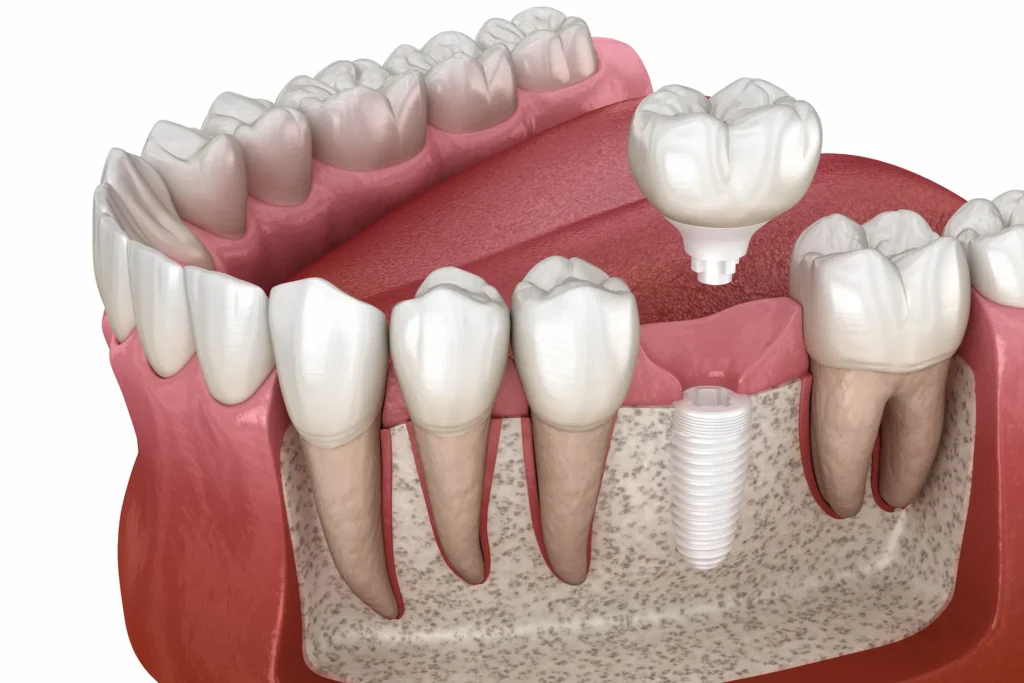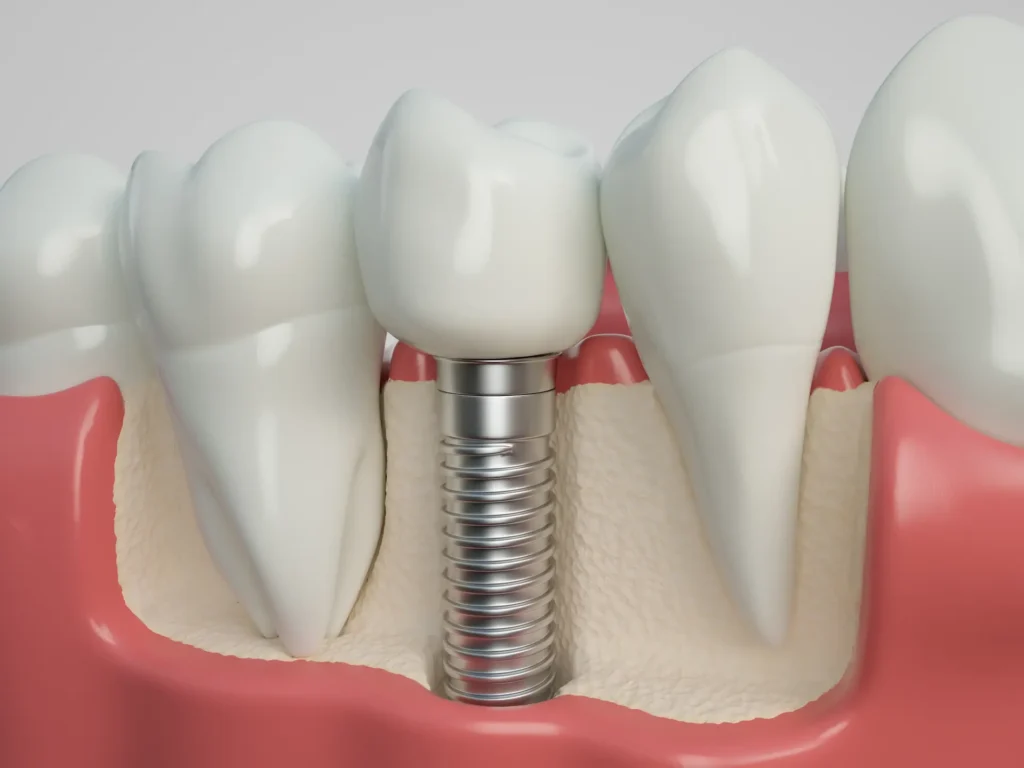Dental implants have become a cornerstone in modern dentistry, offering long-term solutions for missing teeth. When considering dental implants, one of the critical decisions is choosing the right material. Primarily, two materials stand out: ceramic and titanium. These materials have unique properties and benefits, making them suitable for different needs and preferences.
We will provide a clear comparison between ceramic and titanium dental implants, helping you decide which option is best for you.
Ceramic vs Titanium Dental Implants: Side-by-Side Comparison
When deciding between ceramic and titanium dental implants, it’s important to understand how they compare across various factors. These factors include durability, appearance, cost, and biocompatibility, all of which are crucial to dental patients.
Below is a table that presents a side-by-side comparison of ceramic and titanium implants based on these key aspects:
| Factors | Ceramic implants | Titanium |
| Appearance | Implant placed beneath the gum | Implant placed beneath the gum |
| Biocompatibility | High, hypoallergenic | High, but can cause allergies in rare cases |
| Durability | Good, but slightly less than titanium | Excellent, known for longevity |
| Cost | Generally higher than titanium | More cost-effective |
| Suitability for MRI | Compatible, no interference | May interfere with MRI scans in some cases |
| Corrosion | Excellent, non-corrosive | Good, but can corrode in rare cases over a very long period |
This comparison shows ceramic implants offer a more natural look and are hypoallergenic, making them a good choice for patients with metal allergies or those who prioritize aesthetic appearance.
On the other hand, titanium implants are known for their exceptional durability and cost-effectiveness. However, they have a metallic appearance and might interfere with MRI scans depending on the location of the implant.
What are Ceramic Implants?
Ceramic implants are a type of dental implant made primarily from a material called zirconia, known for its durability and natural appearance. These implants have gained popularity for their ability to blend seamlessly with the natural color of teeth, making them a preferred choice for patients who prioritize aesthetics.

One of the standout features of ceramic implants is their biocompatibility. This means they are highly compatible with the human body, reducing the risk of allergic reactions. This hypoallergenic nature makes ceramic implants a suitable option for patients with sensitivities or allergies to metal.
Additionally, ceramic implants are designed to be resistant to corrosion. Unlike some metal implants, they do not deteriorate or corrode over time, contributing to their longevity and maintaining their aesthetic appeal. This resistance to corrosion also makes them a safe option for patients concerned about long-term exposure to metal in the body.
Pros of Ceramic Implants
Ceramic implants offer several benefits, making them an attractive choice for dental restoration. Here are some of the key advantages:
- Ceramic implants have a tooth-like appearance, perfect for front teeth aesthetics.
- They are ideal for patients with metal allergies
- They are made from zirconia, a strong and durable ceramic material.
- Ceramic implants do not rust over time. They maintain their appearance and longevity.
- They do not interfere with MRI scans, which is important for future medical needs.
- Ceramic implants are gentle on gum tissue, promoting healthier gums around the implant.
Cons of Ceramic Implants
While ceramic implants offer several benefits, there are also some drawbacks to consider:
- Limited Long-Term Research: Ceramic implants are relatively new compared to titanium. There’s less long-term research available on their durability over decades.
- Cost: Generally, ceramic implants are more expensive than titanium implants.
- Fracture Risk: Although strong, ceramic can be more prone to cracking or chipping under extreme pressure than titanium.
- Fewer Options: There are fewer design and size options available in ceramic implants, which may limit their use in certain dental cases.
- Surgical Precision Required: Placing ceramic implants demands high surgical precision. They are less forgiving to adjustments during the implantation process compared to titanium.
Understanding these limitations is important for patients to have a balanced view. While ceramic implants are an excellent choice for many, these factors should be considered in the decision-making process.
What are Titanium Implants?
Titanium implants have been used in dentistry for many years. They are made primarily from titanium, a metal known for its strength and durability. Titanium implants have a long history of success in implant dentistry, making them a trusted choice for many patients and dentists.
One of the key features of titanium implants is their ability to integrate well with the jawbone. This process, known as osseointegration, is crucial for the stability and longevity of the implant. The strong bond between the titanium and bone ensures the implant remains securely in place.

Despite their metallic nature, titanium implants are generally well-tolerated by the body. They have a proven track record of safety and effectiveness in dental restoration, backed by extensive clinical research and decades of use in the field.
Pros of Titanium Implants
Titanium implants are favored for several reasons, and here are some of their main advantages:
- Titanium is incredibly strong and durable, making these implants highly resistant to damage and wear.
- Titanium implants have a well-documented track record of long-term success.
- Titanium implants are known for excellent fusing with the jawbone, providing stable support for the implant.
- Titanium is highly resistant to corrosion, which contributes to the longevity of the implant.
- Titanium implants are generally more cost-effective than ceramic implants.
Cons of Titanium Implants
Despite the many advantages of titanium implants, there are some drawbacks to consider:
- Titanium is metallic, which can sometimes be visible at the gum line or through thin gums, affecting the aesthetic appearance.
- Although rare, some people may have allergies or sensitivities to metals, including titanium, which can lead to complications.
- In certain cases, titanium implants may interfere with MRI (Magnetic Resonance Imaging) scans.
- When titanium implants are placed in the mouth with other metal restorations, there is a small risk of galvanic corrosion, potentially leading to implant degradation over time.
Patients need to weigh these cons against the pros when considering titanium implants. Discussing these factors with a dentist can provide more personalized insight and help in making an informed decision.
Choosing the Right Implant Material for Your Needs
Deciding between ceramic and titanium implants involves considering various factors specific to your needs and situation. Here are some key aspects to think about:
- Aesthetics: If the appearance of your implant is a primary concern, especially for front teeth, ceramic implants might be the better choice due to their natural look.
- Allergies and Sensitivities: If you have a known allergy or sensitivity to metals, ceramic implants are likely a safer option as they are hypoallergenic.
- Cost Considerations: Budget is an important factor. Titanium implants are generally more cost-effective, whereas ceramic implants tend to be more expensive.
- Durability and Longevity: If your primary concern is the strength and long-term durability of the implant, titanium is known for its exceptional longevity and resistance to wear.
- Medical Considerations: Consider future medical procedures such as MRI scans. Ceramic implants do not interfere with MRI, unlike some cases with titanium implants.
- Dental History and Bone Health: Your dental history and the current health of your jawbone might make one type of implant more suitable than the other. This is something your dentist can advise you on after a thorough examination.
The best choice depends on individual circumstances, preferences, and dental needs. Consulting with a qualified dentist or oral surgeon is vital. They can assess your situation, discuss each option’s pros and cons, and help you make the best decision for your dental health.
Why Consultation with a Dentist is Important Before Making a Decision
Choosing the right dental implant material is a significant decision that should not be made lightly. Consulting with a dentist or oral surgeon is a crucial step in this process. Here’s why:
- You get a personalized assessment from a qualified dentist. Your bone density, gum health, and overall oral health are checked during this assessment.
- You get to receive expert explanations of ceramic and titanium implants in detail.
- A dentist can develop a comprehensive treatment plan considering your long-term dental health, aesthetic goals, and functional needs.
- During a consultation, you can ask specific questions and express any concerns. This is the opportunity to get clear and accurate information directly from an expert.
- A dentist can help you understand the risks and benefits of each type of implant tailored to your case.
The choice of implant material can affect your dental health for many years. A consultation with a qualified dental professional ensures that this decision is made with the best available information and with your specific needs in mind. Don’t hesitate to schedule an appointment with your dentist or oral surgeon to discuss your options for dental implants.
Schedule a Consultation With Us at NuSet Today!
The decision between ceramic and titanium implants should be based on individual needs, health considerations, and personal preferences. It’s important to weigh factors like aesthetics, allergies, cost, and longevity when making your choice.
Schedule a no-cost consultation with us today to get personalized recommendations for your dental needs. A professional consultation will help ensure that the choice you make aligns with your unique dental needs and lifestyle preferences.
Frequently Asked Questions
What is the disadvantage of ceramic implants?
The main disadvantages of ceramic implants include:
- They have a higher cost compared to titanium implants.
- There is limited long-term research available on their durability.
- A higher risk of fracture under extreme pressure.
- Fewer design options.
Do ceramic implants cost more than titanium?
Yes, generally, ceramic implants are more expensive than titanium implants. The higher cost is due to the material and the more complex manufacturing process.
Why are ceramic implants better?
Ceramic implants are considered better for some patients due to their natural appearance, hypoallergenic properties, and compatibility with MRI scans. They are a good choice for those with metal allergies or who prioritize aesthetic considerations.
How long does a ceramic implant last?
Ceramic implants are designed to be a long-term solution. While there’s less long-term data available compared to titanium implants, they are generally expected to last for many years with proper care and maintenance.
What is the safest type of dental implant?
Both ceramic and titanium implants are considered safe. The safety of an implant depends on individual health factors, including allergies and the condition of the jawbone. Your dentist can recommend the safest option for you.
Can titanium implants cause cancer?
There is no conclusive evidence linking titanium implants to cancer. Titanium is generally considered a biocompatible and safe material for dental implants, with a long history of use in medical and dental applications.
Where can I get dental implants near me?
You can get high quality dental implant services in any of our conveniently located dental clinics near you.
Our clinic locations include:
- NuSet Dental Implants and Oral Surgery of St Louis
- 2821 North Ballas Road #225 St Louis, MO 63131 (Inside Town and Medical Building)
- Get driving directions
- NuSet Dental Implants and Oral Surgery of Scottsdale
- 8800 E. Raintree Dr Suite 170 Scottsdale, AZ 85260
- Get driving directions
- NuSet Dental Implants and Oral Surgery of Nashville
- 5651 Frist Blvd. #300 Hermitage, TN 37076
- Get driving directions
- NuSet Dental Implants and Oral Surgery of Clarksville
- 12431 Clarksville Pike Route 108 Clarksville, MD 21029
- Get driving directions
What types of dental implants do you offer?
NuSet Dental Implants and Oral Surgery offers full mouth dental implant services such as:
- All-on-4 dental implants
- All-on-6 dental implants
- All-on-8 dental implants
- Snap-in/Snap-on dental implants or overdenture
- Zirconia dental implants
- Implant-supported bridge
- Mini dental implants
- Zygomatic dental implants
We also offer same-day dental implants, or teeth-in-a-day, for qualified patients. Contact us for a free consultation, or take our quiz to see if you’re qualified.





